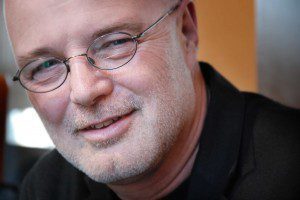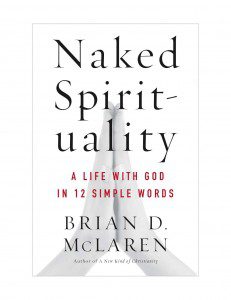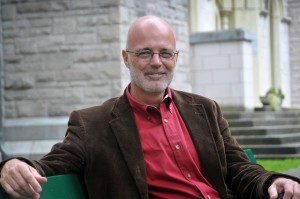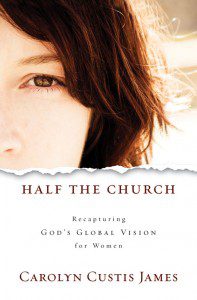Brian McLaren talks about the 12 spiritual practices that can change your life, the future of Protestant denominations, and how he brings his books to life.

Today we continue the Q&A we started yesterday with Brian McLaren, one of my favorite religion authors. His beautifully personal new book Naked Spirituality is a departure from his usual big-picture theology in exploring how 12 different spiritual practices can change lives and hearts.
Flunking Sainthood: Of the 12 spiritual practices you discuss in the book, which has been most personally refreshing for you, and why?
McLaren: At different times, different practices. If you were to say over my whole Christian experience, it would probably be the first practice, centered in the word “here.” I was introduced to it through the old classic, “Practicing the Presence of God.”
During some periods of my life, it was the practice I call rage and refusal, centered in the word “no.” I spent so long feeling guilty for constantly raising my protestations to God, but now I realize that I was engaging in an essential practice that sooner or later, just about everybody needs to learn.
These days, the practice of meditative seeing, lodged in the word “behold,” has been very precious and sustaining to me. I spend a lot of time outdoors in nature, and I constantly savor the experience of seeing God’s creation and simply affirming its goodness with God. “Behold, it is very good.”
Flunking Sainthood: One of the things I like most about your book is that you present spiritual growth through four stages – simplicity, complexity, perplexity, and harmony – but that you concede this is not necessarily a linear progression. In fact, part of the journey involves holding those apparent opposites in tension.
 McLaren: Yes. Like a lot of things, to describe them you have to separate them, but in real life, they seldom if ever come to us except in combination. Still, in my experience, our first time through the four stages, they’re more discreet. For many people, there really is simplicity with very little complexity impinging, or perplexity, with very little simplicity or complexity remaining. But after we’ve passed through these stages once, they’re forever intermingled. One of our huge problems is that we have whole churches and denominations that exclude people who aren’t in one stage or the other. For example, fundamentalist churches specialize in stage one, but are less hospitable the farther you go beyond that stage. And some hyper-liberal churches specialize in stage three and look down their noses at any one at stages one or two – and they may be suspicious of anyone at stage four too. If someone is so unfortunate as to attend a church that is inhospitable to their stage, they really need a book like this to validate their sanity!
McLaren: Yes. Like a lot of things, to describe them you have to separate them, but in real life, they seldom if ever come to us except in combination. Still, in my experience, our first time through the four stages, they’re more discreet. For many people, there really is simplicity with very little complexity impinging, or perplexity, with very little simplicity or complexity remaining. But after we’ve passed through these stages once, they’re forever intermingled. One of our huge problems is that we have whole churches and denominations that exclude people who aren’t in one stage or the other. For example, fundamentalist churches specialize in stage one, but are less hospitable the farther you go beyond that stage. And some hyper-liberal churches specialize in stage three and look down their noses at any one at stages one or two – and they may be suspicious of anyone at stage four too. If someone is so unfortunate as to attend a church that is inhospitable to their stage, they really need a book like this to validate their sanity!
Flunking Sainthood: A few months ago, I heard you speak at the Presbyterian Church national headquarters about the rather bleak future of mainline denominations. You challenged the PC(USA) folks to avoid obsolescence and used the example of the post office in the 1990s burying its head in the sand and refusing to recognize that email, digital retailing, and non-traditional forms of communication were not going away. The post office, on the other hand, is fading fast. What do you think mainline denominations can do, if anything, to change their course?
McLaren: Well, I hope I didn’t paint a unilaterally bleak picture, because I’m actually very hopeful for mainline denominations. In the foreseeable future, it appears that Evangelicals and conservative Roman Catholics will continue to entrench, constrict, contract, and play to their most conservative base. If mainline Protestantism fails to provide an alternative, we’re all in trouble. So I bring in the US Postal Service in hopes of helping folks avoid that bleak future – not to predict its inevitability! It’s more a warning than a prophecy. And of course, I also try to point out that the Postal Service is heroic: they continue to do more and more with fewer and fewer resources and more and more competition.
If I could write a prescription for mainline Protestants, I would begin with these four challenges:
First, to stop considering themselves “mainline.” That term is no longer accurate, and even when it was accurate, it was elitist. The goal isn’t to be culturally dominant, but rather to be effective in mission and faithful in spirit.
Second, speaking by analogy, to diversify beyond the first class mail business and expand into the communication business. More directly, that would mean to stop specializing in the current structures which are unsustainable, and to diversify to promote authentic spirituality, community, and mission in a wide array of forms.
Third, to sequester funds before they’re depleted. The fact is, a lot of things – churches, seminaries, agencies – are going to go out of business. If some of those structures can be celebrated and brought to a joyful conclusion sooner – before they consume all their assets on their way to insolvency – those sequestered assets can be redirected to be the seed money for the new forms of church that are emerging and will continue to emerge in coming decades.
And fourth, to focus on the spiritual life. If we aren’t helping people actually encounter the Spirit of God in a transformative way, why should people bother participating? That’s another reason I wrote Naked Spirituality – to help give shape to this opportunity to refocus on the one really interesting thing about religion, which is God and the soul’s intercourse with God.
Flunking Sainthood: One last question. What’s your writing process? Do you write for a certain number of hours every day? Do you have a word quota? How does the writing mesh with your demanding speaking schedule? OK, that’s really four questions.
McLaren: Before entering the pastorate, I spent several years as a college writing teacher, so questions about writing process really fascinate me. Here’s my situation: I love to write. I really love it. I love research. I love zero drafts and first drafts. I love editing. I love throwing out huge sections that aren’t quite right and starting over. I love writing fast when inspiration is flowing, and I love the struggle of writing slowly when it’s not, wrestling inchoate, rowdy, or furtive thoughts into radioactive words and writhing sentences and well-oiled paragraphs and meandering chapters. So my challenge is isn’t writing; it’s disciplining myself to cut the lawn or take out the trash or go for a bike ride. The writing is almost always a pleasure that I have to tear myself away from.
Travel and writing work well for me. I write well in planes, airports, and hotel rooms. And I love doing Q & A in my speaking engagements, where I can field test and tweak ideas that will later end up in print. And when I travel, of course, I meet readers of my previous books. They teach me the most. They tell me what worked, what still needs to be said, what I was unclear about in the last book, what they are curious about, what’s killing them, and so on. I feel so incredibly fortunate to have so many wonderful, responsive readers and to be able to meet them on the road.
My favorite way to write is to block off a few days and give myself permission to not answer any emails or phone calls, so I can get up early and write for eight or ten or twelve hours straight. When I get in the zone, the hours fly by. The only experience I’ve had like it where time simply vanishes – well, there are two: recording music and fishing. Go figure. I guess for me they all involve creativity, concentration, and playfulness. What could be better than that?

